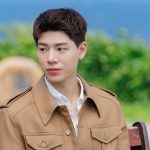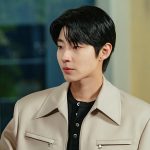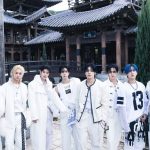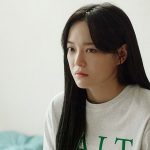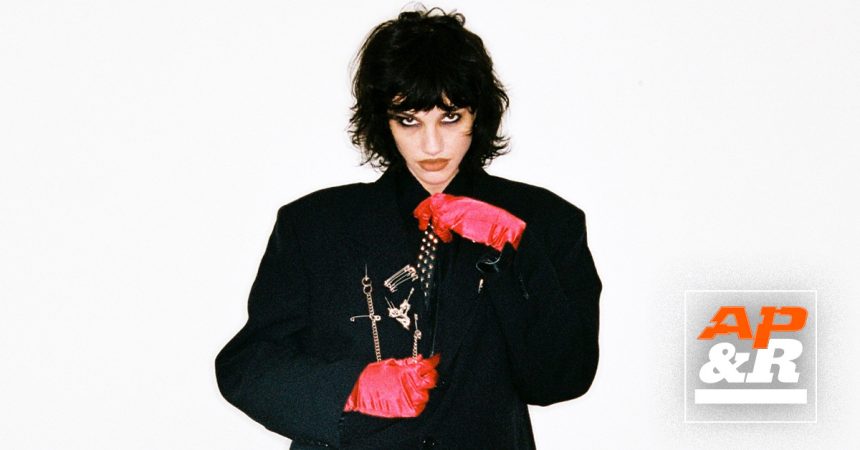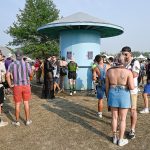Welcome to AP&R, where we highlight rising artists who will soon become your new favorite.
Where does Quincy Larsen end and her dark, inscrutable synth-pop project Dove Armitage begin? “I am her, and she is me,” Larsen tells me. And while the Quincy Larsen who lets me into her world today isn’t covered in fake blood, or wearing clown makeup, as Dove sometimes does, today the artist has tapped into her authentic self more than ever before, both onstage and off.
After moving to LA, Larsen first found her footing as a bassist, working in the city’s indie-rock and post-punk scenes, showcasing her talent and provocative attitude by playing with a slew of beloved bands, including Death Valley Girls. However, like many artists, that was only an era of Larsen’s creative life, one which would lead to another evolution, and ultimately the birth of Dove Armitage. Leaning into the alternative music scene she had been embraced by, and eager to share her own interpretation of the craft, Armitage emerged as a combination of performative shock rock and a pop-infused iteration of the gritty punk music she had been raised on.
Read more: How Anna Sui created some of music’s most iconic looks
Today, Larsen and I are looking at her latest project, Concernless. It’s a divergence from anything we’ve seen from Larsen, or Armitage for that matter. There’s more synth, and there’s more self. Where “darkness” has been a perennial theme, Larsen is diving headfirst into her own experiences, sharing raw, emotional, and painfully honest lyrics that hark back to childhood, heartbreak, and trauma. However, though Larsen has let her demons in, she cradles the listener through each track with a clear, bold pop sound — far more traditionally “pop” than any of her previous projects. Swaying synths, electro-pop beats, and throbbing drum electronic drum kits work in perfectly paradoxical balance that pulses and pushes through the heavy, pungent sentiments at hand.

Larsen holds many things in both hands on this record. Her personas, being one. Darkness and light, an obvious second. And in hot pursuit is her ability to revel in the moment, and look back fondly. However much her sound has shifted in shape and “genre,” Concernless — produced by Chris Greatti and grandma — pays dues to her past, with elements of grungier instruments, punk-esque hooks, and of course, many an ode favorite instrument, the bass, around which Armitage has built each addicting track around.
AP was lucky enough to chat with the artist herself, who spoke with us about her intimate new EP, Linkin Park, her Ramones cover band, and more.
Let’s break down the EP. It’s super bass-heavy — as someone whose roots are in that instrument, can you explain why and how you structured it like that, around basslines?
There’s something so powerful and sexual about the bass. I’ve always been drawn to synth bass and bass guitar. I wanted to home in on an instrument that inspires me so much, and each song began with the bass. Especially when making the songs “Sex on Display” and “Glass in Me,” it left a lot of room for playing with melody and other production elements. I just love feeling heavy bass in my chest. Playing it is almost like masturbating, and it is glorious.
Can you also explain the importance of doing so, what the bass line means in music as a whole — as a bass player, and a front person?
As a whole, the bass is the soul of a song. It’s the air in the lungs, and it keeps the blood circulating. I appreciate so much songs without bass, but across all genres, the bass dancing with the drums and then the other instruments playing around them is immensely important. As a front person, I do take a different approach to bass. I find it’s definitely harder to sing while playing bass than guitar, depending on what you’re playing. You have to sit behind or ahead of the rhythms and keep track of your vocal melody and breathing while your hands are in charge of such a different element. I suppose in simpler terms, it’s like air bending and earth bending at the same time.

You’ve shifted genres throughout your musical career. What instigated that, and what do you have to say about that at all, the institution of genre, the reception from the punk community, or lack thereof, as you went a bit more pop?
I don’t really think about genre when I’m making a song. I wanted to showcase what I am best at — bass, ambient music, and writing lyrics — and challenge myself to experiment with other elements that I’m inspired by but are new to me in a song creation sense. “It Won’t Die” and “Brittle” were the first songs made and set the tone for this kind of writing and production.
When I made my first EP, ///1, which was more lo-fi ambient pop, the punk community certainly did not ride with me through this change. I lost thousands of followers when I announced the project in 2020, and it took a lot of strength to keep being resilient and pushing forward. I got many hate messages from old punk dudes, people telling me I was a joke or to “stick to what I was good at,” and some people I thought were friends dropping off saying it was “pandering” or “pathetic.” I even got booed at one of my early shows in Long Beach! I wasn’t sure why people cared so much. I think there was just a perception of me built in people’s heads that no longer made sense to them… To be honest, it may have emboldened me a bit.
The EP addresses some serious darkness. Where did this desire to face negativity so head-on come from? Were there challenges you met that you felt inspired to call attention to?
I had a really difficult young adult life and really struggled to find happiness and comfort in my own skin. I endured a lot of abuse, and it distorted so much of my thinking and perception of reality. I thought to be loved was to be harmed, possessed, and controlled. I started to feel trapped in a hall of mirrors, and my solution at the time was to walk away. However, after hitting a serious rock bottom, I realized I had some serious issues and [needed to] make a lot of changes, and I really invested in my mental and emotional health. The further I walked away from myself and what I needed to address, the more lost I became. I hit it head-on, and it started to heal me.
I found a lot of peace-making music in headphones, as a sort of sound bath. It’s where I fell so in love with sound design, finding frequencies that I felt in my chest and soul and put me into a calm and almost meditative state.

You’ve alluded to Dove being an alter ego for you. Do you still feel this way? Are Dove and Quincy becoming more one and the same, or are you leaning in?
I am her, and she is me. I joke often that Quincy is the “sweetie pie” side of me, and Dove is the resilient one. I created Dove to find a strength in me I didn’t think I had as Quincy. I didn’t have this reason at the time, but in hindsight, I think splitting myself helped ease the pain of extraction necessary for music creation because I couldn’t stop no matter what. I’ve found that more comfortable as a musician, and I accepted this confidence. Dove was always in me, and I’ve been in the process of claiming her as myself.
As someone who has played with other major artists, what would you say is something you’ve learned from those experiences as someone with your own project?
Learning other artists’ creative vocabulary and seeing the world through their lens definitely challenged me and helped me grow as an artist. Collaboration is such a gift in this way, sharing your world with others and getting to see someone else’s world is so beautiful and intimate. There is so much to be learned from collaborating, and I think the biggest one is letting go of your ego. It’s all about creating an environment that people feel comfortable and free to create in.

How did you get into music? What’s your first memory of it? What’s a moment you had with music that made it all click?
I always felt it inside me! I loved, and still love, video games growing up mostly because of the soundtracks. I felt it so deep in my soul. I would become mesmerized by it, and the concept of world-building using sound was so fascinating to me. I was desperate to investigate it. Sometimes I’d just let the game run and let the sounds wash over me….until enemies appeared and I’d get killed in the game.
Did your parents play music?
My parents aren’t musical at all! But my grandfather was. He was an incredible singer, a crooner akin to Frank, Roy, all the greats. My grandma also played piano and had this incredible electric piano in their house that I loved to play around with. It was my first intro to making sounds and little beats. I’d just spend hours and hours on that piano, and sometimes my grandpa would come and sing along.
What was the first band you played in?
Technically a Ramones cover band when I was 14. I was the drummer, and I was horrible. The first band I created from scratch was my old punk band Cat Scan.

What was the first album you bought with your own money?
Linkin Park’s Hybrid Theory and the Pure Moods, Vol. 1 compilation album.
What is a horror story you have from tour?
Last summer I got stranded in Bologna, Italy for a whole night with the drummer and guitar tech. It doesn’t sound so bad at first, but the entire city was booked out for the weekend; no cabs, no Ubers, no hotels, no trains, nothing. We wandered around and slept on the street trying to find a way back to where we were staying 40 minutes away until an Uber finally came through at about 7 a.m. To make matters worse, I was also on my period, in heels, and in immense pain!
Who would your dream collaboration be with?
Slipknot. I have an endless list of dream collaborators, but Slipknot would be so rogue and chaotic. It makes no sense, but I wanna make it make sense.

